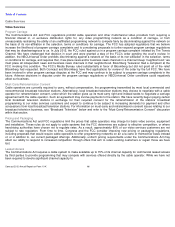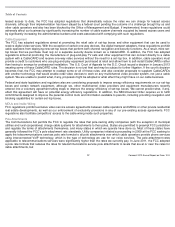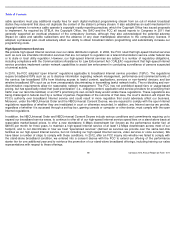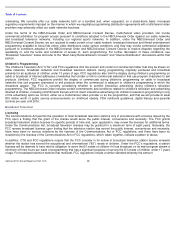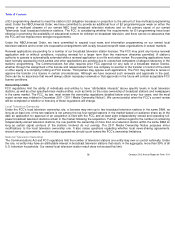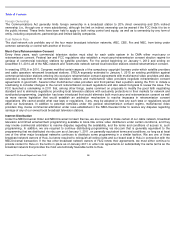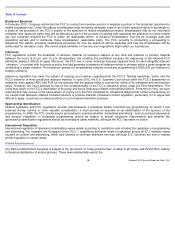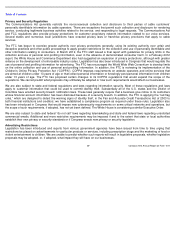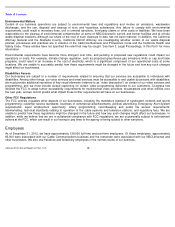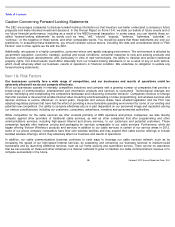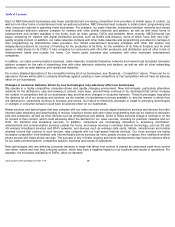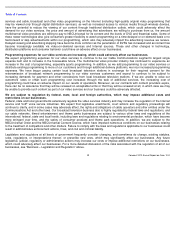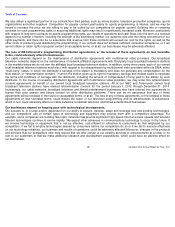Comcast 2012 Annual Report Download - page 28
Download and view the complete annual report
Please find page 28 of the 2012 Comcast annual report below. You can navigate through the pages in the report by either clicking on the pages listed below, or by using the keyword search tool below to find specific information within the annual report.
Table of Contents
Broadcast Spectrum
In February 2012, Congress authorized the FCC to conduct an incentive auction to reassign a portion of the broadcast spectrum for
mobile broadband use. Under the statute, broadcasters may voluntarily relinquish some or all of their spectrum rights in exchange for
a share of the proceeds of the FCC’
s auction of the spectrum to mobile broadband providers. Broadcasters that do not voluntarily
relinquish their spectrum rights may still be affected as part of the process of clearing and repacking the spectrum for future mobile
use, but Congress required the FCC to make “all reasonable efforts” to preserve broadcasters’ over-the-
air coverage area and
population served, and to reimburse those broadcasters’
reasonable costs. The FCC currently is conducting a proceeding to
implement this statute, including establishing processes for how the spectrum will be repacked and how the broadcasters will be
reimbursed for relocation costs. We cannot predict whether or how any such regulations might affect our businesses.
Indecency
FCC regulations prohibit the broadcast of obscene material on television stations at any time and indecent or profane material
between the hours of 6 a.m. and 10 p.m. Broadcasters risk violating this prohibition because the vagueness of the relevant FCC
definitions makes it difficult to apply. Moreover, the FCC has in some instances imposed separate fines for each allegedly indecent
“utterance,”
in contrast with its previous policy that had generally considered all indecent words or phrases within a given program as
constituting a single violation. The maximum penalty for broadcasting indecent or profane programming is $325,000 per indecent or
profane utterance.
Indecency regulation has been the subject of ongoing court review, regarding both the FCC’s “fleeting expletives”
policy and the
FCC’s definition of what constitutes indecent material. In June 2012, the U.S. Supreme Court struck down the FCC’
s assessment of
indecency fines against ABC and FOX on the grounds that the agency failed to provide fair notice of its standards and enforcement
policy. However, the Court declined to rule on the constitutionality of the FCC’
s indecency policy under the First Amendment. This
ruling may result in the FCC’s clarification of its policy and future indecency-
related enforcement actions. From time to time, we have
received and may receive in the future letters of inquiry from the FCC prompted by complaints alleging that certain programming on
our owned local television stations included indecent or profane material. Increased content regulation, particularly if it is vague and
difficult to apply, could have an adverse effect on our broadcast television business.
Sponsorship Identification
Federal legislation and FCC regulations provide that whenever a broadcast station transmits any programming for which it has
received money, service or other valuable consideration, it must provide an accurate on-
air identification of the sponsor of the
programming. In 2008, the FCC commenced a proceeding to examine whether “embedded advertising,”
such as product placements
and product integration, in broadcast programming should be subject to stricter disclosure requirements and whether the
sponsorship identification regulations should be extended to cable networks, although the FCC has taken no action.
International Regulation
International regulation of television broadcasting varies widely according to jurisdiction and includes the regulation of programming
and advertising. For example, the European Union (“E.U.”)
establishes minimum levels of regulation across all E.U. member states
focused on content and advertising, which also extends to nonlinear television services, although E.U. countries are free to impose
stricter regulation in certain areas.
Filmed Entertainment
Our filmed entertainment business is subject to the provisions of “trade practice laws”
in effect in 25 states and Puerto Rico relating
to theatrical distribution of motion pictures. These laws substantially restrict the
25
Comcast 2012 Annual Report on Form 10-
K



